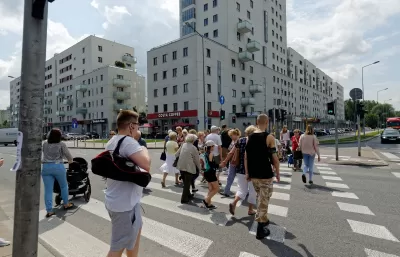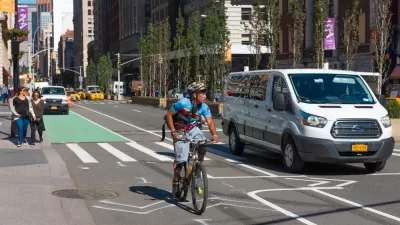The assumption that it’s “impossible” to live without a car in many American cities perpetuates infrastructure projects that privilege and induce driving.

In light of the many harmful effects of an overreliance on automobiles, “Why can’t we ask people to drive less and use transit or walk or bike?” asks Rachael Ludwick in The Urbanist. “Because, as implied in a recent New York Times article and claimed commonly elsewhere, it’s supposedly ‘infeasible’ in much of the United States to live without a car.”
This is largely because, Ludwick argues, “Our system has for more than eighty years subsidized driving in myriad ways that people don’t even notice.” Yet “People who can’t or don’t drive learn to get around wherever they live: and they live everywhere including places that are ‘impossible’ or ‘infeasible’ without a car.”
For Ludwick, walking is often a joyful experience. “But it’s not always a joy for everyone because many places do lack safe and convenient ways to walk, bike or bus. Our lives – and frankly everyone’s lives – could be immensely improved if only more people were driving less and were less committed to protecting driving and space for it.”
Ludwick also points out the environmental impact of driving. “In the United States, 29% of our carbon emissions come from transportation, mostly private vehicles,” calling on more people to try new transportation modes and pressure policymakers to fund safe walking and biking infrastructure and public transit. “Millions of Americans trying to get around without their cars will build support for the myriad of fixes we need to create a transportation system that works for everyone.”
FULL STORY: What If You Didn’t Have to Drive a Car?

Maui's Vacation Rental Debate Turns Ugly
Verbal attacks, misinformation campaigns and fistfights plague a high-stakes debate to convert thousands of vacation rentals into long-term housing.

Planetizen Federal Action Tracker
A weekly monitor of how Trump’s orders and actions are impacting planners and planning in America.

Chicago’s Ghost Rails
Just beneath the surface of the modern city lie the remnants of its expansive early 20th-century streetcar system.

Bend, Oregon Zoning Reforms Prioritize Small-Scale Housing
The city altered its zoning code to allow multi-family housing and eliminated parking mandates citywide.

Amtrak Cutting Jobs, Funding to High-Speed Rail
The agency plans to cut 10 percent of its workforce and has confirmed it will not fund new high-speed rail projects.

LA Denies Basic Services to Unhoused Residents
The city has repeatedly failed to respond to requests for trash pickup at encampment sites, and eliminated a program that provided mobile showers and toilets.
Urban Design for Planners 1: Software Tools
This six-course series explores essential urban design concepts using open source software and equips planners with the tools they need to participate fully in the urban design process.
Planning for Universal Design
Learn the tools for implementing Universal Design in planning regulations.
planning NEXT
Appalachian Highlands Housing Partners
Mpact (founded as Rail~Volution)
City of Camden Redevelopment Agency
City of Astoria
City of Portland
City of Laramie





























